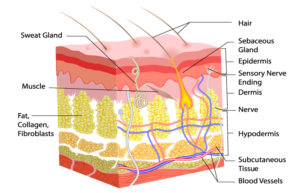The skin is a vital organ but one that we often take for granted. It is the largest organ in the body and performs many different functions.
The private dermatologists at The Devonshire Clinic can provide medical and cosmetic expertise to help you keep your skin at its best. We also treat the entire range of skin disorders, ranging from rashes, acne and skin allergies to complex scars and skin cancer.
What does the skin do?

The skin is responsible for protecting tissues and organs from the outside world, forming a waterproof barrier that helps regulate our temperature. Sensors in the skin allow us to communicate with the outside world through touch.
The skin is also the outer layer of the body, the interface with other people so its appearance can be hugely important.
Common skin problems
Most of us experience skin problems at one time or another. The skin is in contact with the outside world, so is prone to injury, cuts, bruises, allergic reactions and infections.
Many skin disorders produce the same general symptoms – itching, redness, soreness, flaking skin and painful skin patches. Differentiating specific skin disorders is complex – seeing a dermatology expert is often the only way to obtain an accurate diagnosis.
Seeing a private dermatologist in London
At The Devonshire Clinic we use experience and up-to-date medical knowledge combined with the latest diagnostic techniques to diagnose and treat all common skin problems, such as:
- Eczema
- Acne
- Skin allergies
- Dermatitis
- Psoriasis
- Rosacea
- Warts and verrucas
- Sun sensitivity
- Skin infections – scabies, impetigo, shingles, cellulitis, fungal infections
- Precancerous lesions such as actinic keratoses and Bowen’s disease (squamous cell carcinoma in situ)
- Skin cancer (melanoma and non-melanoma, basal cell carcinomas, squamous cell carcinomas)
We can also help minimise
- Scarring
- Signs of ageing
- Sun damage
Skin is composed of several layers
- The epidermis, the outer layer, is made up of dead cells, which are packed together closely. These break off frequently but still provide a good, waterproof and protective covering
- The dermis, the middle layer, contains the base of all your skin hairs, sweat glands, nerve sensors and small blood vessels
- The subcutis is mainly connective tissue. This is where the larger blood vessels that supply the skin lie and where fat deposits can accumulate
Skin stats
- The average adult has around 2.75 kg of skin, which covers 1.7 square metres
- Skin on the soles of your feet has no sebaceous glands and is around 1.4mm thick
- Skin on your eyelids is the thinnest anywhere in the body – only 0.02mm thick
- Your skin regenerates entirely every month
- Over 30,000 dead skin cells are lost from your body every 60 seconds
- Each person, no matter what their skin colour, has the same number of melanocytes (pigment-producing cells)